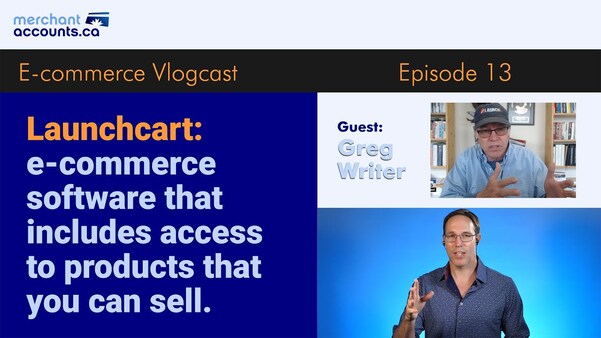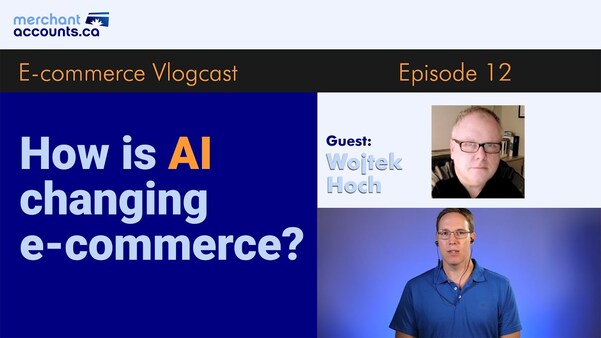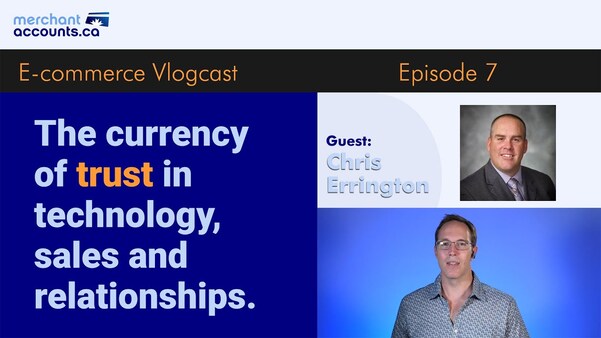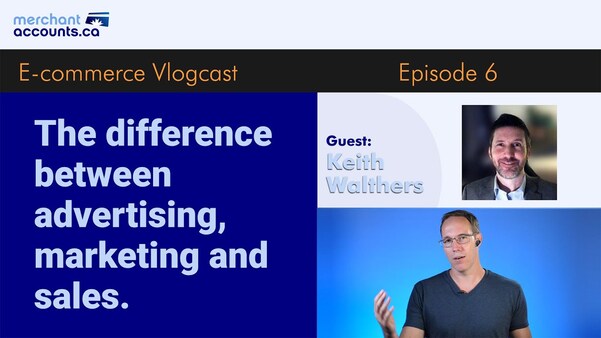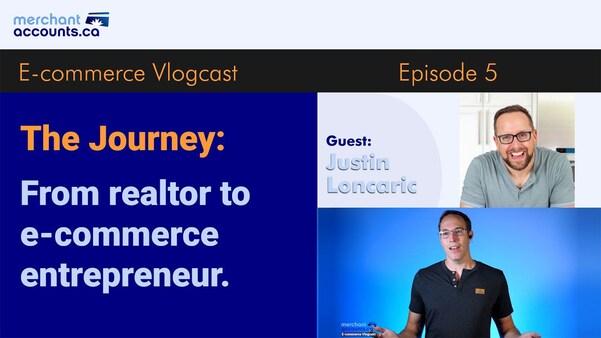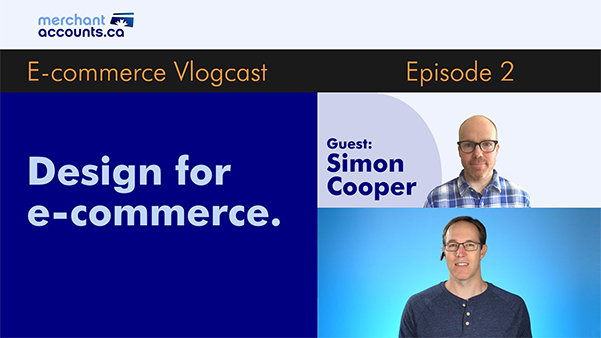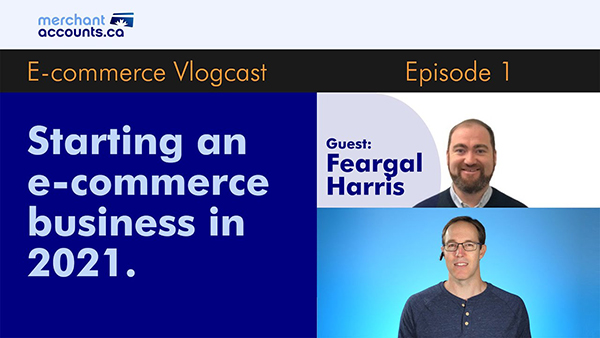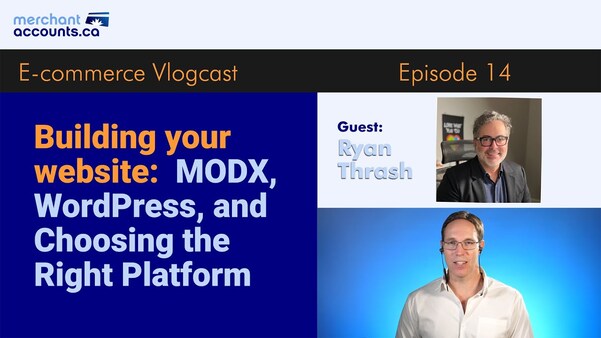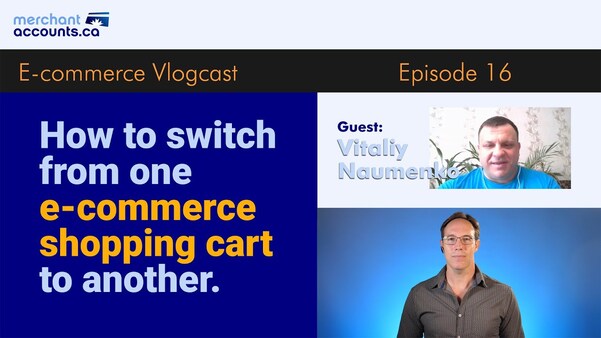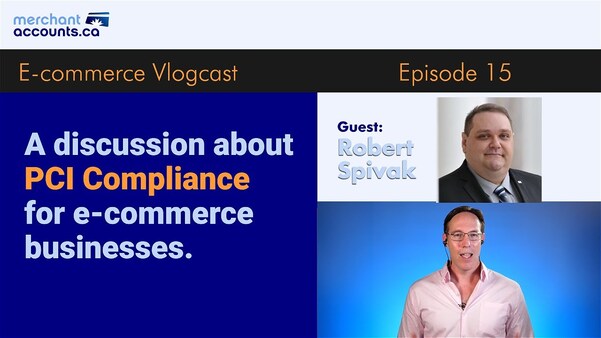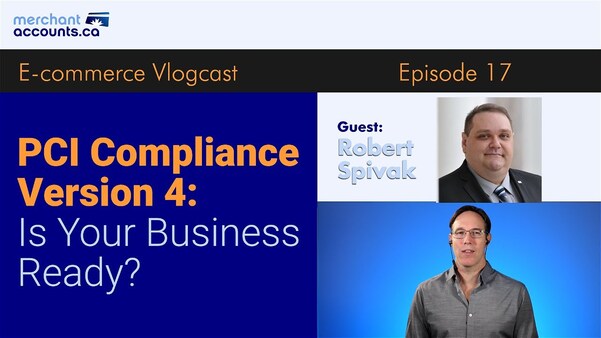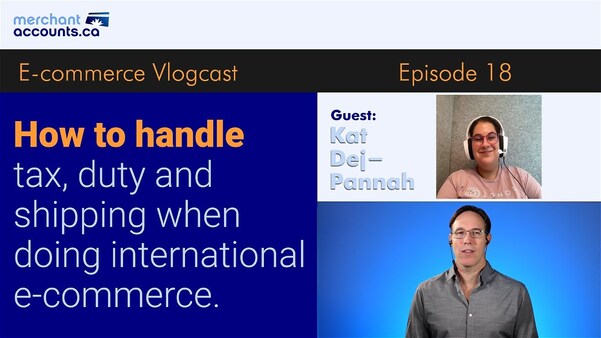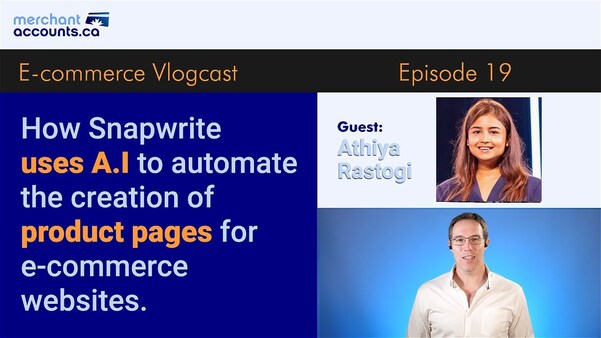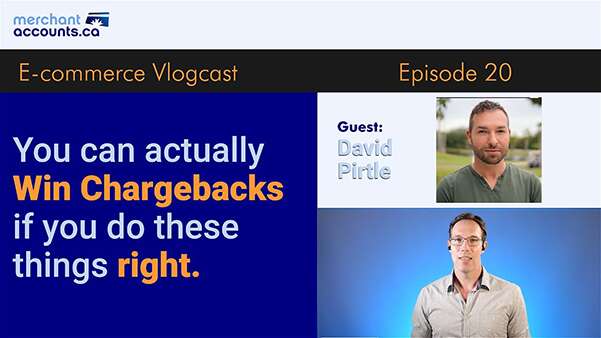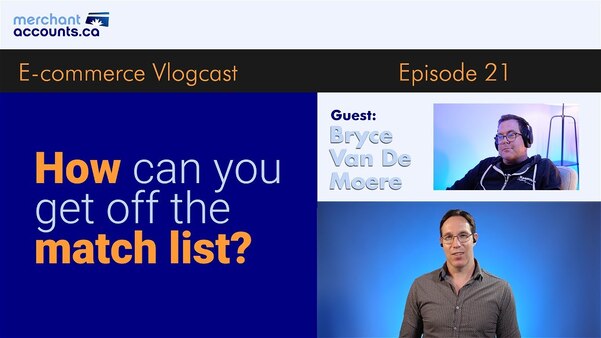March 15, 2022
by David Goodale
How to use low code solutions to build complex e-commerce websites quickly, and on a tight budget
(Slightly edited from video transcript for greater readability)
David Goodale 0:02
Hello, David here at Merchant-Accounts.ca. Today I'm talking to Josh Bartolomucci from Foxy cart, we're going to be talking about how modern E-commerce can be implemented by leveraging No Code solutions. Because building an E-commerce website can be totally overwhelming. And it's one of those areas, you can just spend loads of money. And I've noticed over the years, and I think this is a good thing, businesses are moving away from reinventing the wheel. I'm talking like the add to cart buttons. If there's a zillion E-commerce websites out there, why would they all need to build everything from the ground up. And there's a lot of reasons on offsetting that, though, why you want a custom or a somewhat customized E-commerce website because it helps you accomplish your goals more effectively.
David Goodale 0:49
So Josh is the marketing manager over at Foxy, which is a very flexible shopping cart, and it's built around the idea, at least I think it's built around the idea of not trying to give you everything in the kitchen sink, but more about dropping their functionality into your website to make it easier to deploy more custom E-commerce websites. Josh has many years of expertise in web development and E-commerce. Josh, thanks for joining, I guess first question that I managed to explain Foxy well because I get confused about it. It's a hard platform to summarize.
Josh Bartolomucci 1:21
Yeah, David, thanks for having me. Yeah, I think you nailed it. You know, the idea is that Foxy was made to be a tool that you can drop into your existing toolset. So when you need E-commerce, but your existing toolset doesn't support that. Or maybe there's some functionality that you're missing. Foxy is a great fit.
David Goodale 1:39
That's what I thought. And I used to be a web developer like 100 years ago. I know I don't look at but any commerce years, 100 years. And so I always lean towards doing everything custom. But that's not really reasonable anymore. But I don't like the rails in front of me with many platforms not to name any names. So I like the flexibility. And whenever I have people that come to me with like, something complicated, something weird, Foxy is one of the ones that pops into mind, because it's kind of like a, I don't know, it's like a weird solution problem solving platform. I don't know, maybe that's a good way to say it.
Josh Bartolomucci 2:17
Yeah, I know exactly. I mean, Foxy was made to be pliable to your needs. And that's kind of it's the opposite with other options, right? Sometimes you're like you said, you're kind of stuck within the rules are relative what they have set before you. And Foxy is made to be pliable. So we don't have any really opinion of what tools you're using, and even what you're trying to do, we just focus on the cart and checkout experience and then let you do the rest.
David Goodale 2:40
That makes sense. So I'm just gonna jump right into it. I said at the in the intro there, it's really easy to spend a lot of money building an E-commerce website, obviously, I think you're going to agree with that statement. Is that one of the benefits of Foxy for merchants that if you want to build something custom, but you don't want to reinvent the wheel. So it's like because I think what we ultimately want to talk about today is how to deploy things effectively. And part of effectively means not spending a boatload of money unnecessarily on something.
Josh Bartolomucci 3:10
Yeah, exactly. So there are a lot of solutions out there that range in price. And, you know, when you need something more custom or specific to your use case, Foxy is a great option for that, you know, again, going back to being pliable to your needs, and also not reinventing the wheel, we cover a lot, you know, we've been doing this for like 15 years. So there's a lot of functionality experience packed into what Foxy provides. And so, and sometimes we've got people that need just a little bit of what we do, sometimes we get people to need a lot of what we do. And the great thing is you can enable and disable what functionality you need for your specific use case without breaking the bank, which is really important.
David Goodale 3:47
And for more basic users like me, I'd be in that category. If you to take it out of such an abstract, or maybe there's non developers watching this, like, you know, the Add to Cart button, let's say you have a website, and you're pretty happy with your website, you have a web host, you're pretty happy with the web host. But you want to add E-commerce functionality to your website, like a basic level, it's like you can drop Foxy into what you've got. And it just turns almost like I know that I can do much more. But it can turn a static website into kind of like an E-commerce enabled website. And without the merchant needing to worry about the security issues. You're not going to touch card data and stuff like that.
Josh Bartolomucci 4:26
Exactly. Yeah, Foxy really works out to carry the PCI compliance and security burdens. So you don't have to as the merchant, and then like you said, it's easy, you could just drop it into what you're already doing. And, you know, usually, there's not, for most use cases, there's not a lot of code involved. So it's pretty easy to do. And we worked hard to really lean towards different platforms like wicks and Webflow and Squarespace and whatnot, and to help those users with tutorials and walkthroughs on how to easily implement Foxy into those situations.
David Goodale 4:56
So I know that you wrote a blog post about No Code you've spoken to me a little bit about No Code actually don't understand what it is. No Code sounds impossible. So maybe you could describe what No Code or Low Code is to me because I'm interested in learning more.
Josh Bartolomucci 5:11
Yeah, absolutely. So my take on No Code or Low Code are, you know, being able to build a full system or platform or meet your needs without really having to do custom development or even hire developer and many times that consists of piecing different tools together, that really handle the different functionalities needed for your use case. So obviously, like Foxy for E-commerce, maybe airtable for data management, and then maybe like Zapier or Integra mat, to tie those tools together to really talk to each other. And all the tools I just mentioned, could easily be used without any coding experience to really pull off a lot of great use cases.
David Goodale 5:51
Now I see your developer knowledge is shining through because I've heard of Zapier and I might have heard some of those other names. Okay, so like something maybe I'm just going to throw a name at you can tell me if this would be included in like that pile, MailChimp, because you don't want to build your own. I don't even know if people still use that. But if you don't want to build your own list management software, people used to use MailChimp. Is that kind of what we're asking about?
Josh Bartolomucci 6:14
Absolutely. And MailChimp even, you know, They've really grown what they you know, as far as their service offering and functionality, they've got, you know, built in automations, and things like that. So yeah, I would consider MailChimp part of that No Code or Low Code stack.
David Goodale 6:28
Okay, so I'm understanding it. So it's so my premise of what I thought it was, I think is what it is. It's like, basically, hey, here's some people that are really good at managing email lists, and they have a really nice, easy API. And I don't know, maybe there's one out there first, I'm sure you're gonna tell me there is for like ship figuring out shipping or something like that. Or maybe that's more of a Foxy job. I don't know. But pick that one. I'm just gonna pick on it. Okay, well, tell me about that. And so let's say I'm coding a website, you know, in fact, I'll tell you, so I just bought a lift efoil. It's an electric hydrofoil surfboard, which I love. It's like the most I'm living from the future liberally.
David Goodale 7:08
But it's really cool. But the battery is like 100 cell phone battery, the battery itself is about $4,000 US, big and juicy, you can't bring it on an airplane, because you know, ever seen like a cell phone battery catch on fire. If fits catches on fire, the whole block is burning down. You know, maybe I'm exaggerating. But point being there's all kinds of like special shipping stuff. In fact, part of the battery ships from wherever in the States, the board ships in Puerto Rico. I'm just making stuff up, I'm just gonna put you on the spot. So I was a developer, and I'm trying to figure out how to do something like that, how could No Code or Low Code come into solving that problem? If it even applies that?
Josh Bartolomucci 7:50
Well, you touched on a very complex subject, and that's shipping, right? So I think there are tools to help you know, you've got like ShipStation, you've got Shippo, you've got a few others that really become like connection pools or connector tools that really let you send data, let's say the order and customer information, and then send that data to different carriers for fulfillment or whatnot. So there are some options out there to help with that. It's a very complex subject, those for a shipping goes.
David Goodale 8:19
Well, and I came up with like the hardest thing. I'm not going easy on you today-
Josh Bartolomucci 8:25
That's right. There are tools to help, I think, but as far as you know, that's the key thing. This is a good point thing to consider with No Code and Low Code. There's not always a solution for everything, you know, there. There are many No Code and Low Code, you know, things I've put together that still require a little bit of maybe custom script or whatnot to fulfill the rest of that functionality. You know, so I don't think there's ever truly a hey, there's No Code involved. There are a few situations like that. But I think most people that have dabbled in it a little bit, have come to realize very quickly, you may need a little bit of extra experience or knowledge to fulfill some of those pieces. While other things it may be just a click of a button, but maybe not everything's like that, or as easy as that.
David Goodale 9:09
Well, I mean, like it doesn't even to me, I can't find them where you would ever not mean to do anything. Because the whole idea is taking off the heavy lifting. You know, it's like, I want someone to you know, do the farming and get the ingredients and bake the cake. I'm just going to show up and eat it. I want as much people do as much of the hard work as I can. So that there's a little for me to do and then just reap the benefit and you're paying for that sir. I'm guessing you're paying for all those services, Zapier, MailChimp. They've built these great API's is that the right way to describe it. It's like an API or like a service.
Josh Bartolomucci 9:43
I think a lot of it deals with API connections, maybe web hooks and other technologies. But yeah, I mean, at the end of the day, it's about working smarter, right? And sometimes there is a cost. So if I could go and I could build something custom out and hire a team or do it myself, that does this thing. that maybe Zapier does as far as let's say, a connection between Foxy and air table. So an air table is kind of like, you know, Google sheets on steroids. It's a visual Database Builder, and I want to send that data in there. Now I could build a custom integration, you know, some money in time, or I can just happen to Zapier and pay a monthly fee. And it just works. And within, you know, 5 to 10 minutes, I can have that already sending the data over to air table. So you kind of balance out what's it worth to you. And also, what I love about No Code and Low Code tools is that the companies that do whatever they do, Zapier for example. You know, it just works. You're not having to trial and error, a lot of things, they've got companies that just they're gonna be team members that just focus on that stuff. And so a lot of times, you know, you're taking on the burden of does it work? Are there edge cases, we haven't thought of, what if it breaks, things like that, compared to let's just pay the people that already do it really well. And we'll pay a monthly fee and have it working.
David Goodale 11:00
That makes sense. And it's stress tested by Brazilian people just by virtue of the fact that it's so popular. So okay, so I'm going to throw another question at you then. So what's the trade off with No Code? Because here, let me I'm going to qualify my own question. Anytime to me, something's made easier, it means there's some sort of rail up that makes things easier. Does it constrain you, if you go to No Code? Are you ever painting yourself into a corner? Or are they just kind of designed? Maybe they're designed from the perspective of it's just like you hook in and out? I don't know, I'm curious to know about what your thoughts are on that?
Josh Bartolomucci 11:34
Yeah, it varies, right? I mean, there are some tools that are just really, really mature. And so they know what their customers need and want. And so there's a lot of flexibility there. So, hey, it's easy to pipe the data into this tool. And we've also made it easy to connect to other tools from this specific tool. So it really varies depending on what you're using. I think the goal of any company that's helping with No Code or Low Code is to be more flexible as time goes on. And the demands of the No Code and Low Code movement are growing every day. And so people want it to just be, listen, I want to do this thing, I don't want to have to code it. Help me figure that out. And I think software companies are listening to their customers. And they're making it easier for those different needs.
David Goodale 12:16
You know, I kind of want to make a point to the viewers here, because I've experienced this myself. So I have a short term rental property, like a vacation property that rents for a week at a time or two weeks, or whatever. And I remember back in the day, this is not that maybe this is four years ago, and I knew that I was going to build a very simple website that was going to keep track of the rentals. And I realized I needed to have a calendar functionality on the website. And I'm like, Okay, I'm gonna roll up the sleeves. Sure I haven't coded in 20 years, but I can figure this out. I just need to kind of track this and the date and this and blah, blah, blah. And, you know, because I'm always like, assuming oh, this is a small job. This is no problem as soon as actually forced my brain to look at what I was going to do. I was like, Good lord, I don't, I can't fathom how much I don't want to do this. So then I went out. And maybe this isn't exactly loco. But similar concept.
David Goodale 13:06
There's a company called owner rez, and what owner rez specifically, it's like a platform for people that manage properties, like on Airbnb and VRBO. They hook in, they power the calendar, they keep track of the payments, through reminder emails to people deposits, balances. And I had that thing working in like, literally, in one day, if I had to code that, well, I'd probably still be coding now. So maybe that's kind of like a Low Code or No Code solution. But in that case, it was that actually is kind of like Foxy, but just for Villa or Rental properties. But I love the idea, the reason I'm going on with this rant here to the viewers, is it's so much more cost effective, in some cases, to take all of the hours that have been invested into this platform and pay a reasonable subscription fee, then build it yourself. And especially for young companies.
David Goodale 13:59
The use case that I'm thinking of, in my mind, it's not a start-up, it's an E-commerce company that has a website that has problems, I'm don't mean like to detract from my theoretical business, all I mean is they know how they could improve their business. They know what their limitations are, but they don't want to just go invest in building because you can solve a lot of these problems very quickly, then, by just leveraging these technologies that makes it very cheap, in some cases to solve otherwise hard to solve problems. If I just summarize, No Code did I think I just did I think I made a good use case there compelling argument.
Josh Bartolomucci 14:39
No, I think you're dead on. I mean, at the end of the day, you know, everybody wants to start selling quicker. And No Code and Low Code just helps you do that. And yeah, you could always hire somebody to build this out custom. And maybe there's a little bit more flexibility, but what's it going to cost to host and manage the technologies needed? What's it going to cost to do it to call that developer when something breaks, you know, there's a lot of pros to No Code and Low Code. I think more than there are cons. So I think it's definitely something to consider for any business that wants to start selling fast. And do it right the first time.
David Goodale 15:15
So I'm going to ask you a question that the first time that I kind of heard about this concept was so to the viewers not watching. Brett is the founder of Foxy cart, he works with Josh, I was talking to him, whatever, like quite a while ago, we're talking about databases. And he was telling me about databases that were posted on the cloud. And in my mind, and like, but websites could pull data from them. And my mind was blown, because how can you have like database information shooting across the web? And have it be secure? Is there this is just more of a point of my own curiosity? Is there like a low or No Code solution for database management that you're familiar with? I'm just curious.
Josh Bartolomucci 16:05
It depends on the use case, my experience has mainly been with tools like airtable, which I would consider a database tool.
David Goodale 16:12
That's the one that Brett was talking about.
Josh Bartolomucci 16:14
Yeah. And air tables, great. I mean, and the use cases are crazy. I mean, we had a user who needed to actually, the data need to be accessible from other parties in a third party company. So with air table, we could easily say, okay, here's your main, you know, source of data. But we want to send some of the data but not all of it, it's based on a specific condition to this other database automatically when it meets a certain criteria. And that way, only that team has access to that data that we tell them they can have access to. And in addition, we want them to be able to add to that data. So not only just view it, but then add to it for their own needs. And with something like air table that was a fully No Code solution, literally visually sync to this table, or this database give access to these people, you're done. And I mean, you're talking about something that to mentally work through before No Code or Low Code was really a thing. That would have taken a lot of time and money.
David Goodale 17:16
This is interesting. So I got that. So my nerd credentials are pretty strong. Like just in life, I am pretty nerdy, my family, anything technological breaks needs to be set up on the go to person. What's interesting talking to you about this stuff, is when you're explaining this, it kind of makes sense to me. But if I'm not aware of this, then I have to assume the typical, small and midsize business owner is almost certainly not. And it sounds like there's a lot of tools that people could be leveraging. And they just don't know, too. So they just, you know, they stick my sequel on the server or whatever, and they do it the old fashioned way. And maybe it's a lot more work. So I'm going to ask a question then, like, what are some of the things that you can do today in E-commerce, not just with Foxy, but that you couldn't do even a few years ago, because this might sound like old hat to you. But this is like, genuinely fascinating. And I'll bet you a lot of people aren't aware about this stuff.
Josh Bartolomucci 18:13
Yeah, I mean, the thing with No Code, it really helps you accomplish things like you're saying that maybe couldn't have been easily done. One thing that I've loved and appreciate is with No Code tools, and I'm going to go back to air table just because it's probably one of my favorite. And you can just do so much with it. But is that something like air table or a similar tool is that you can take that and add functionality to the platforms you're already using. So let's say there's a feature that doesn't exist in your existing shopping cart. And let's say one of those features may be a tracking follow up, okay, the order has been placed. And I want to send the tracking code, but only when certain criteria is met, you can easily do that with a tool like air table by syncing that data. And then with different conditions, air table has built in automation.
Josh Bartolomucci 19:00
So we can say, if this criteria is met, I want you to connect to my Gmail account. And I want you to send an email from my Gmail account with this information from the database for that specific customer. And all of it is literally No Code. It's a visual builder. Another cool use case would be something like that we've had come up a few times. You know, a lot of times when an order is out of stock, it just says out of stock and you potentially lost that customer, you lost that sale if there's no follow up or call to action. But what if instead of showing out of stock, what if we showed a signup form, where they put their name and their email address, and then as soon as that item comes into stock, they're going to get notified with the link right to add that product to cart and that all the variants already configured the color, the size everything they had that configured previously, they're gonna get notified that that's ready to go and click here to buy it now.
David Goodale 19:53
So right from Outlook or Gmail, you click a link in your back in the checkout funnel.
Josh Bartolomucci 20:00
Exactly. And you could do something we've helped do that with some of our users, where in airtable, we're just a form submission gets sent, it passes in the product name, the SKU, the variance of chosen, the URL of the product page. And then it adds that to a table in air table. And as soon as that's connected to a product or inventory table, and it just checks, and it says, as soon as that SKU inventory goes anything above zero, or whatever threshold you set, let's fire off an email. And again, we have access to all that data that is passed in there now product and customer data. And something like air table allows us to just build that automation, No Code, which is pretty amazing.
David Goodale 20:39
I mean, it's so maybe it's just the way that I learned as well. It's almost like I need to see it in front of me to understand it other than the fact that I know that it's possible, and I'm understanding the concept. But sure, there are worlds of options available that probably a lot of people aren't aware of. And I think maybe as you know, E-commerce, and even the web continues to mature people will continue. And honestly, maybe I'm standing here oh, nobody knows. Maybe everybody knows about me, but I don't think so.
Josh Bartolomucci 21:11
I don't think so I think there's a lot of people that still don't know. But I think the good news is, is that I think low code tools are becoming household names. Zapier has been around a long time. And I don't know if they were specifically the first one to do what they're doing as far as data connection.
David Goodale 21:26
Is that Zapier the one that allows anything to connect to anything, because when I saw it, I remember thinking, it's like Zapier gets it from here to there, or something like that.
Josh Bartolomucci 21:35
Exactly. It's kind of the middleman. So you have a trigger, and you have an action. And you know, they've got 3000 Plus apps that you connect to it, as well as native functions and connecting to your own custom web hooks and things like that. And then there's tools that have come along and said, hey, we love Zapier zoom, we're gonna do it better. And you've got Integra mat, and you've got some others, you know, that do similar things. So I think it's becoming more normal. And the thing I love about competition is that people get better options, right? The tools get better, the teams are pressured to do better build the functionality that their competitor has. And then No Code becomes more of a household term for businesses. And so I think it's an exciting time for sure. I keep track of a lot of what's coming up as far as No Code and Low Code tools. And there's a lot and it's, you know, some of them are just kind of trying to get rich overnight, other ones really have a good motive and have a good long term plan. But I think it's gonna become more affordable and easier for businesses to use No Code tools.
David Goodale 22:38
So you know, as I'm listening to you, I'm starting to wonder then, is Foxy in a way a No Code solution for E-commerce? Because in a sense, your may be kind of like the library people who come to for all the E-commerce stuff in a sense, is that right or is that wrong?
Josh Bartolomucci 22:55
I think in many cases, we can be that No Code or Low Code tool. You know, there are some tools that just require it's fully visual, right? It's 100% visual, there's no or hardly any copying and pasting, right? Or having to type anything out manual. And I think I think the sometimes in the No Code movement, there is an expectation for that. Right? Like, well, don't make me think, don't make me do anything. I just wanted to click and have, you know, an Amazon Marketplace work.-
David Goodale 23:20
You probably have No Code. I want No Code. Exactly.
Josh Bartolomucci 23:23
Exactly. But I think people realize, wait, okay, I have to do a little work here. So we've worked really hard in especially with platforms like web flow, and Squarespace, a lot of these DIY website builders, we've worked hard to tap into their native functionality and build up tutorials and walkthroughs that require No Code or very Low Code. And by Low Code, it may be as simple as copy and paste this and change that one parameter, right? Like maybe like your store name or something. So I think, yes, we could be considered a No Code or Low Code tool. Also, in relation to that we've got some new drop in what we call elements that we've been working on, like a donation element, literally, it's a snippet of code, you can modify the settings in there, what am I donation options? What are the designation options do I want to offer recurring in one time, and literally, it's just a small snippet. And you can plug that into any website, and you instantly have a donation form on your website already styled mobile friendly, ready to go, I would consider that a No Code or Low Code solution.
David Goodale 24:23
That's interesting. That's really interesting. And at the same time, going back a few years, I first learned about Foxy many years ago, at the time, Foxy was really direct like, this isn't for everyone. We want the people that work with us to have some level of, of technical expertise just because I think because you're taking our code, you're dropping it into something you need to be able to do that, or we're not really a good solution is that still true today, you still are kind of targeting that type of demographic.
Josh Bartolomucci 24:55
That's a great question. So I think, you know, you still we were really focused on developers, right? The key thing to keep them on with Foxy is we don't actually manage the products for you. So we're leaning on you to manage the product data wherever you want. So whether that's a content management system, or maybe you don't even need that, maybe you just have a landing page where you're taking pre orders for a product. And you've got that one SKU, you know, so I think we still, you know, obviously lean towards developers, but the landscape has changed the website builders, the platforms, the tools, and over the last few years, they've changed drastically. So you've got a lot of people without really any coding experience, that are building pretty complex sites, and have complex needs, maybe for themselves or for their clients. And so again, as I mentioned earlier, we're really trying to lean towards that more in providing resources that maybe used to, we didn't have a tutorial on how to do this exact thing. Now we do because maybe our you know, our user base back then really, they understood that, that was basic stuff because most of them are developers. But now we're really trying to create a resources in a way that not just the developer, but anybody, this can be a quick and easy setup. Again, not every case. But we're trying to make that that easier and quicker for most use cases.
David Goodale 26:09
That makes sense. You know, it's funny, as you were saying, people are not developers, and maybe you seem, I remember, in Unix, I'm just off on a tangent now. But every time I would read like a Unix or Linux or any sort of, they would use a term, I think it was "Foo", it was a term for like a variable in Linux, that they would use every time that you were trying to, oh, my gosh, well see now because-
Josh Bartolomucci 26:36
You might have lost me.
David Goodale 26:39
That's okay. Basically, my point of my story is, the manuals are so technical, I couldn't make heads or tails of it. But so it's good to know that you're reaching out also to less, you know, technically advanced users. So that's good to know.
Josh Bartolomucci 26:53
So I'm gonna, I want to clarify too you know, even though we were, we're trying to simplify things, that's the beauty of Foxy though, it can be as complex or as pliable as you need it to be. So we've got some crazy use cases, too. So we don't claim to be a perfect fit for all. But when we're a good fit, we're a really good fit. And so we'll be the first to tell somebody, hey, we just don't think this is gonna be a good fit. Because we want you to have the right tools quickly, don't waste your time. We don't want to waste your time with this. So but I think we're getting better at helping with the No Code and Low Code, users that are looking for something a bit more out of the box, which we're not always going to be like something like Shopify or competing product, right. But then again, we're very pliable, and we can handle those use cases that those other solutions can.
David Goodale 27:36
Interesting. So I'm going to change the direction of the conversation for a second here, it was just because you've been in E-commerce for quite a long time. I'm curious if you see any trends or the industry moving in a particular direction, and I'm not framing that up? I'm just kind of asking, hey, Josh, what do you see changing or interesting in E-commerce right now?
Josh Bartolomucci 27:56
It's a great question. I mean, I don't know that can go a lot of different directions. I mean, as far as, you know, products and the type of businesses, you know, you're looking at a lot of CBD, a lot of those, you know, more high risk type industries, we see a lot of that. And the other thing would be subscription services, you know, box, you know, box subscriptions, we see a lot of that come through. And that's obviously a pretty trending thing. I think it has been for a while. And that's something Foxy can help with as far as like recurring payments, or you know, auto ship or auto pay and things like that. So, those are two things we see a lot of, I hope that answers your question.
David Goodale 28:39
No, it was a super broad question, because I wanted you to be able to go in any direction. I'm going to come up with like an example of kind of a thesis that I have. I totally don't do this. Okay. But I'm wondering like, and you would know this better than me because Foxy has so many shopping cart clients, are people using it to power their E-commerce? Do you see a lot of generic retail websites that Amazon has impacted? And what I mean by that, it's more like a thing that I wonder like, if I need a hockey stick, is it hard to compete against Amazon on price and distribution? So I'm wondering if E-commerce websites today are moving away from traditional simple retail catalog? And it's more about solving a problem or giving you something maybe Amazon or the or Walmart camp? I'm just curious to know what your thoughts are on that.
Josh Bartolomucci 29:35
That's a great question. I think what I see more are niche products, right? The products that you know, just can't be mass produced, and that could be a number of things, right? Unique watches or clothing and things like that. You know, I think people are tending to care more about the small business now. I think people are caring more about the quality of the product they buy. Now there are obviously some things, I'm not going to go buy toilet paper from some online merchant.
David Goodale 30:05
Oh my gosh, you just destroyed my idea.
Josh Bartolomucci 30:09
Like, you know, there's just some things, it's like, listen, I don't care who's making this, I just know I need a bunch of it at an affordable price. But there are other things where it's just like, you know, even you know, for somewhat related, you know, at Christmas time we like to sometimes get gifts for the team members. And we like to look sometimes at our merchants or other small businesses that don't necessarily have to use Foxy. And so we're looking for those gifts, you know, and there's different things like we've got, you know, we've got a honey producer, that's a user of ours, and you know, they have some amazing different honeys and butters and different things. You know, those are things you can't just, you know, go get anywhere. But it feels even better when you know, you're supporting, you know, a local bee guy, you know, who's doing this who's got a family, compared to maybe some mass produce honey.
Josh Bartolomucci 30:55
So I think people care about that. And I think people are giving people, businesses or giving people better experiences now, too. And with the No Code tools, and the Low Code tools, and the website, builders, and everything is accessible to pretty much anybody. Now, if I have an idea, I can actually run with it without really any overhead. And I can say, listen, is anybody interested, I don't even have to initially go to Kickstarter or any of those, you know, platforms, I can just I can start selling online and see if there's interest. And I can create a business very affordably, which is really exciting to me. And again, a quality product that, you know, supports a small business. I think it's amazing.
David Goodale 31:36
That's interesting. I wonder if E-commerce has gotten more personal in the sense that, you know, you're talking about people thinking more about small businesses. And I think we have for lots of reasons, one of them may be bring COVID, and small businesses were obviously more impacted by Amazon. Or, sorry, more impacted than Amazon. That's interesting to me. I bet you that web copy itself, and the way that it's written has become more personal. In other words, I find that websites talk, do have you noticed that because of social media, and I don't know, Instagram and different things, people have more of a, they bring their personnel in their presence into it, as opposed to, we are the greatest provider. It's more about who they are as humans, like, hey, this is what we do. This is our team. This is how we can help you.
Josh Bartolomucci 32:32
Absolutely. I think every true company as a story. I think every good product has a story. And I think people are tapping into that more no, right? It's like, it's about telling the story. And sometimes that connects with people more than just it meets a need. Wow, there's okay, I can relate to that. Whatever that is, right? So yeah, absolutely. I think things are more personnel. As far as you know, even Web flow is an interesting platform. It's a DIY, visual Website Builder. Anybody can go in and even create animations and all sorts of stuff. And one thing we've seen with the web flow community specifically is there's a lot of stories being told, especially with E-commerce. And so you, it's not just I go to the site, and there's an Add to Cart button, it's actually let me show you the journey of this product this unique, you know, sweater or whatever it is you know, homemade candles that we're selling. And there's it's more it's a visual experience, and also a journey of the story behind that product behind the company. And then the end result is buy this product now. Which compared to your typical Amazon setup is who cares about the story when you're on Amazon, right? It's like, I want it. You know, is it coming tomorrow?
David Goodale 33:43
Yeah, exactly who is the cheapest seller, how can I get it fast? Yeah, exactly. So a few minutes ago, I asked you like a really open ended question about you. I'm going to ask you an even more open ended question. I'm totally putting you on the spot. You go anywhere you want, you can check out of it as well. But I always ask people this because you never know, when you get these great little titbits. I'm wondering if you have any secret advice or just a great tip for E-commerce merchants. In fact, I'm going to tell you, you already gave one today, you gave one when you talked about if people abandon their checkout, then you can use an air table to somehow you know, when it comes back in stock, shoot an email to them. You already gave like a super great one. But I'm now I'm making come up with two. So can you come up with another great tip for our viewers?
Josh Bartolomucci 34:31
Yeah, I think the thing I've learned over the years is and you and I are talking about this earlier, don't wait till everything's perfect. And you know, a lot of times we've worked with users and stores and we've literally had stores sign up and they don't launch for a year later. Now there may be a lot of you know, reasons for that. But what we find sometimes is people try to get it perfect. And what they'll find is even when you launch it's still not perfect. So I would recommend you know, get out to the market as quick as possible, don't perfect it, don't wait till it's perfect to get out you know, there's you can learn a lot now.
Josh Bartolomucci 35:06
You know, a lot of people spend a lot of time and money, tweaking little things here and there on their checkout or on their website, that their customers actually if you asked them and did a survey or a sounding board, they wouldn't even care, they heard about these other things that you completely miss. So you know, I have a bad habit of trying to make things perfect before I finish it or submit it to the team or whatever. And I'm working on not doing that. And I think the same for businesses too.
David Goodale 35:30
That's really and that's actually in fairness, not even just an E-commerce tip because you can be in the planning stage for the next 20 years where you can just launch and listen, sometimes you don't want to learn as you go, if I ever am having a surgery, I'd like the surgeon to be kind of know what he's doing. But in the world of like sales and online commerce, like you'll learn more by doing than you will by theorizing, I think that's a fair statement. I mean, I believe.
Josh Bartolomucci 35:55
I think so too. I think a lot of people spend a lot of time and money on things that really, they don't they think it's an issue or they think it's gonna be a problem, but come to find out it was this other thing that they fully missed. And we see that a lot in support, right, we'll have people you know, merchants maybe email say, hey, you know, I want to move this little thing here on the checkout page, or whatever. And then sometimes, a month later, they'll be like, hey, we want to move that back. Our customers didn't like it, you know, it's, you know, and that's time wasted for them. So don't wait till it's perfect, get feedback, and start selling sooner than later.
David Goodale 36:30
You know, it's so funny. I'm glad that I don't know, if somebody had like an Excel sheet or like a little pie graph of the amount of hours I wasted choosing between 17 point or 18 point font, that'd be horrible. Because I know that gets gonna be way too big for me. So I'm going to keep this in mind in my own life when going forward. So, you know, I really have found this so interesting. And I really think that Foxy, for anybody that's looking at something custom is a really good choice. I don't think there are a lot of platforms like Foxy. And, you know, Josh, maybe I would let you before we sign out here, if there's anything you want people to know about Foxy or anything, I'd give you the opportunity to tell our viewers.
Josh Bartolomucci 37:17
Yeah, I appreciate that. I mean, really, if you have E-commerce needs that either a just don't exist in your existing platform, maybe you're using a Website Builder, maybe they don't support E-commerce at all, or maybe they support E-commerce, but they don't integrate with the gateway that you need or support that one feature. That's where Foxy comes into play. And you can drop us into what you're already doing. Another use case is just when you need something that you've outgrown your existing platform or E-commerce platform, and you need something with more flexibility, more customization, maybe more power, more features, you know, we've been doing this for a long time, I think we're going on 15 years.
Josh Bartolomucci 37:56
E-commerce is not an afterthought for us a lot of systems out there, they drop an E-commerce functionality with some limited features. If you're serious about selling online, you want to be serious about the platform you go with because you don't want to find out in the middle of the game, that something doesn't exist or something doesn't work. And, you know, we worked hard to make sure that our merchants and our users, you know, just have the best shopping experience for their customers.
David Goodale 38:21
That's really great. Josh and I found this to be a really interesting discussion. You really truly did educate me on what No Code means and really made me realize that you can do very custom things on I'm not gonna say shoestring budget, but really a very tight budget mostly on it with a series of subscription fees, one of which may be Foxy. So I absolutely. That's great. Thanks so much for joining Josh. And you have a great day there.
Josh Bartolomucci 38:47
You too. Thanks so much. Okay.
Related Topics
March 08, 2023
David speaks to Greg Writer, Founder and CEO of Launchcart. Greg shares some insights into how he's working to launch a new platform in the e-commerce shopping cart software space, that addresses the particular problems that new entrants to e-commerce run into. Greg explains how they are working to solve those problems, and shares some interesting business insights along the way.
February 28, 2023
AI such as ChatGPT has, at an almost unbelievably rapid pace, make people aware that it's capable of so much more, and is so much better than most people realized. It's not that dissimilar to the advent of the internet and what eventually became the dotcom bust. Everyone knew it was tremendously capable, but how do you use it? How do you use these incredible tools to improve and grow your business? In this discussion David speaks to Wojtek Hoch about how AI is changing e-commerce.
May 09, 2022
Without trust people don�t purchase. How do you build trust? How do you maintain trust? Especially if at a small company? Today, we speak to Chris Errington of Metontec to learn how to better engender, build and maintain trust, and even find out what it really means.
April 06, 2022
How do you win new customers? What is the intersection between advertising, marketing and sales? In the latest episode of the vlogcast we talk to Keith Walthers from Mad Ads interactive, who shares his expertise on the customer buying journey, and how to win more customers for your business.
March 25, 2022
The Journey is a series that tells the personal stories of business owners. Today we speak with Justin Loncaric, a career realtor and serial entrepreneur about the importance of finding the right expertise, what he learned when building his real estate team, a growing food delivery business, and his newest project helping home owners get interest free financing to perform much needed upgrades before selling their home.
November 01, 2021
In our second vlogcast we talk to Simon Cooper from Hybrid Ideas about why good design is about more than being pretty. It's strategic and should be created with the intent of accomplishing a specific goal.
October 03, 2021
In our first episode we speak to Feargal Harris from Numinix. We explore many different considerations when starting an e-commerce business in 2021. Learn more about starting an online business in 2021...
April 20, 2023
It's easier than ever to build a website. That doesn't mean it's going to be an effective website. In this episode of the podcast David speaks to Ryan Thrash, CEO of MODX to talk about the importance of choosing the right platform when building your website.
June 29, 2023
David speaks to Vitaliy Naumenko of Cart 2 Cart, a shopping cart migration service that helps merchants to switch and port their data from one shopping cart software platform to another. Vitaliy shares advice not just on how to move from one shopping cart software to another, but also advice on which platforms to choose, and what to watch out for when migrating.
June 21, 2023
PCI Compliance is often perceived as complex and intimidating by business owners. David speaks to Robert Spivak at Control Gap in order to learn more about how small and mid-sized businesses can tackle their PCI compliance issues.
August 10, 2023
Merchants seeking to achieve PCI compliance will have to comply with PCI Version 4 which is the new standard landing in March of 2024. In this discussion David speaks to Robert Spivak of Control Gap to find out the big differences with PCI Version 4.
September 18, 2023
Have you ever bought something online and been surprised by the duty charged upon delivery, or even a problem getting your package through customs? David speaks to Kat Dej-Panah of Zonos about how to remove these barriers and make it easier when selling to international customers.
February 16, 2024
David continues to interview experts who have learned how to practically apply AI to e-commerce businesses. In this episode David speaks to Athiya Rastogi to learn how she built Snapwrite with her co-founder, and how it�s helping brands, retailers, pre-loved and vintage clothing merchants to leverage AI and run their business far more efficiently using this new technology.
February 23, 2024
It often seems difficult or impossible to win chargebacks. In this episode of the podcast, we speak to David Pirtle of Chargebacks911, where he explains that the information you provide, how you organize, and being concise can be the difference between winning and losing.
March 06, 2025
Merchants that are put on the match list lose the ability to process credit cards. Making things worse is the fact that it�s difficult or impossible to get off the list. David speaks to Bryce Van De Moere and Jeremy Stock from Global Legal Law firm to learn what you should do if you find yourself on the match list.
Need professional guidance?
Contact us for a free one hour consultation.
Can I Help Lower Your Processing Fees?
If you found this content helpful, will you give me the opportunity to quote on your business?
View Rates


